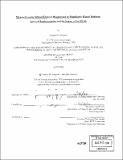Massachusetts School District responses to standards-based reform : issues of implementation and the impact of the MCAS
Author(s)
Sakagawa, Tamara M. (Tamara Mariko), 1973-
DownloadFull printable version (4.992Mb)
Alternative title
Massachusetts School District responses to standards-based reform : issues of implementation and the impact of the Massachusetts Curriculum Assessment System
Other Contributors
Massachusetts Institute of Technology. Dept. of Urban Studies and Planning.
Advisor
Frank Levy.
Terms of use
Metadata
Show full item recordAbstract
Massachusetts embarked on an extensive mission to reform its failing public education system in 1993 with the enactment of the Education Reform Act. The Reform Act was noteworthy for being the first piece of legislation that was designed to raise the standards of education for all public school students through a series of policies that affected all aspects of public education including, educational spending, teacher hiring, curriculum development, and accountability. The most critical and controversial piece of the legislation was the Massachusetts Curriculum Assessment System, a test of student knowledge of curriculum and standards that was administered at three grade levels across five subject areas. The MCAS test included a high-stakes component, which meant that all tenth graders were required to pass the exams in order to graduate beginning in the year 2003. With the year 2003 rapidly approaching, districts across the state are attempting to accelerate the pace of implementation of reform efforts. MCAS test scores released for the years 1998 and 1999 have not been encouraging in that districts have reported huge percentages of students failing the exam and there has been little improvement in test scores over time. This thesis is a report of how three districts that believe in the reform effort and the MCAS are dealing with the implementation of reform. Wobum, Springfield and Greenfield are notable because they represent three very different communities that are all struggling with the same issues. Interviews conducted for this study have shown that these three districts have taken similar paths and face similar challenges. All districts have completed extensive self-evaluations and goal-setting exercises. All districts have elected to focus on curriculum alignment and instructional improvement through professional development. And all districts and schools have begun to use both qualitative and quantitative data to inform instructional practice. However, even with these similarities in approach, individual districts are experiencing different results as measured by MCAS test scores, and the districts as a groups are still seeing limited gains in student performance, particularly at the upper grade levels. This thesis attempts to explain some of the barriers that impede progress or that interfere with the true reporting of progress to date and suggests areas for further research.
Description
Thesis (M.C.P.)--Massachusetts Institute of Technology, Dept. of Urban Studies and Planning, 2000. Includes bibliographical references (leaves 54-55).
Date issued
2000Department
Massachusetts Institute of Technology. Department of Urban Studies and PlanningPublisher
Massachusetts Institute of Technology
Keywords
Urban Studies and Planning.